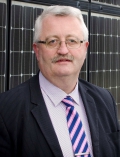- Prospective Applicants
-
Current PhD Researchers
- Careers and Opportunities
- Careers
- Go Global
- Science Shop
-
Supervisors
- Find a PhD
- PhD Manager
In the UK wastewater treatment consumes ~1% of the total generated electricity and produces five million tonnes of greenhouse gases. The sector is under significant pressure to become more energy efficient and has embarked on research initiatives to explore opportunities at the Water-Energy nexus. Demand for innovative new technologies is also increasing in developing countries where UN guidelines push for improved levels of hygiene and sanitation (on average 35% of wastewater is not collecting worldwide) [1].
The energy content of wastewater is five to ten times greater than the energy required to treat it [2], therefore this ‘waste’ has significant potential to produce a range of energy rich byproducts, including hydrogen [3] – development of the hydrogen economy is highlighted as a Government priority within the recently announced Clean Growth Strategy [4]
The aim of this interdisciplinary project is to develop a Decision Support System that could help wastewater utilities evaluate new and existing energy production technologies and assess the value to their business. Example technologies include: microbial electrolysis cells (MEC), photocatalytic systems, microbial fuel cells (MFC) combined with photoelectrochemical cells (PEC), electrolysers powered by renewable energy sources, and the reforming of biogas produced by wastewater sludge fed anaerobic digestion.
The PhD candidate will work logically through a series of work-packages to investigate and model energy production technologies, initially focusing on MEC which are widely considered to be the most promising technologies [4]. A demonstrator MEC will be developed by the PhD candidate and used to aid in industry and public dissemination of the potential for energy generation from wastewater.
The outputs from the PhD will help wastewater managers to compare different opportunities for the production and use of hydrogen. The model will predict the cost pattern of hydrogen production at local sites, provide insight into the required supporting infrastructure; and show the economic potential of hydrogen production from wastewater. The PhD proposal aligns with the H2020 ALICE project, coordinated by Ulster, and the PhD candidate will have the opportunity to spend time in different European wastewater utilities collecting data and working in collaboration with industry to fully understanding their needs and requirements.
Examples of the impact created from this PhD are:
*Advance knowledge and capability to understand the opportunities for hydrogen production from wastewater, in line with the circular economy approach and UK Government policy.
*Fully understand the economic and market potential for hydrogen production from wastewater.
*Help industry to transition towards “positive energy” wastewater utilities and reduce greenhouse gases – in line with UK targets.
*Reduce the energy demand (and therefore the cost) of wastewater management in both the UK and developing countries.
Central to achieving these goals is the collaboration between Engineering and Life and Health Sciences whereby the mix of disciplines (water, energy and microbiology) will permit the development of demonstrator microbial electrolysis cells with increased efficiencies.
The PhD candidate will have the opportunity to join the H2020 RISE Alice project (http://www.alice-wastewater-project.eu/), “Accelerate innovation in Urban wastewater management”, which is coordinated by Ulster University. The project is a Research and Staff Exchange, RISE, project that covers all travel expenses for ALICE project partners in order to develop research and knowledge transfer. Several partners in the ALICE Consortium are wastewater facilities and research centres. CIEMAT, for example, is a research centre in the South of Spain, where Ulster have had several s collaborative researchers have tested and evaluated systems for photocatalytic production of hydrogen from wastewater.
References
[1] IEA, World Energy Outlook 2016
[2] Shizas, I. and Bagley, D.M., 2004. Experimental determination of energy content of unknown organics in municipal wastewater streams. Journal of Energy Engineering, 130(2), pp.45-53.
[3] Zeng, K. and Zhang, D., 2010. Recent progress in alkaline water electrolysis for hydrogen production and applications. Progress in Energy and Combustion Science, 36(3), pp.307-326.
[4] Clean Growth Strategy. Available from: https://www.gov.uk/government/publications/clean-growth-strategy.
[5] Escapa, A., San-Martín, M.I. and Morán, A., 2014. Potential use of microbial electrolysis cells in domestic wastewater treatment plants for energy recovery. Frontiers in Energy Research, 2, p.19.
Applicants should hold, or expect to obtain, a First or Upper Second Class Honours Degree in a subject relevant to the proposed area of study.
We may also consider applications from those who hold equivalent qualifications, for example, a Lower Second Class Honours Degree plus a Master’s Degree with Distinction.
In exceptional circumstances, the University may consider a portfolio of evidence from applicants who have appropriate professional experience which is equivalent to the learning outcomes of an Honours degree in lieu of academic qualifications.
If the University receives a large number of applicants for the project, the following desirable criteria may be applied to shortlist applicants for interview.
The University offers the following levels of support:
The scholarship will cover tuition fees at the Home rate and a maintenance allowance of £19,000 (tbc) per annum for three years (subject to satisfactory academic performance).
This scholarship also comes with £900 per annum for three years as a research training support grant (RTSG) allocation to help support the PhD researcher.
Due consideration should be given to financing your studies. Further information on cost of living
Submission deadline
Monday 19 February 2018
12:00AM
Interview Date
12 March 2018
Preferred student start date
mid September 2018

Telephone
Contact by phone
Email
Contact by email